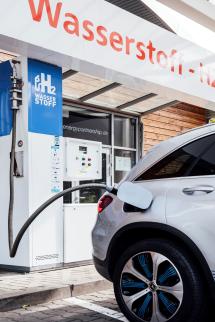Hydrogen car: range, advantages and disadvantages of the innovative technology
Electric motors are becoming increasingly popular: Quiet and low-emission in operation, they can be used to significantly reduce CO emissions, among other things.2emissions from road transport. In addition to the electric car with battery, there is another technology that avoids long charging times: the hydrogen drive. In the following, we will go into how it works, advantages and disadvantages and answer the important question: What about the range of a hydrogen car?
What is special about hydrogen propulsion?
How far can you drive with hydrogen? This is how good the range of the hydrogen car is
In addition to the costs, the range of innovative engine technology is particularly important for users – how far they can drive before they have to refuel. We have broken down for you what costs you can expect and what a hydrogen car has to offer in terms of range.
A kilogram of hydrogen currently costs 13.85 euros in Germany and is enough for about 100 kilometers of travel – so the costs per kilometer are comparable to those of a diesel car. But does the hydrogen car achieve ranges that can keep up with a combustion engine? In fact, one tank of fuel can last up to 600 kilometers, and even up to 900 kilometers are possible for models with a larger tank. This means that the range of modern hydrogen cars is comparable to modern gasoline and diesel vehicles – considerably higher than that of most electric cars with batteries.
In addition to low-emission driving with competitive performance and operating costs, hydrogen cars offer numerous other advantages:

-
Sustainable mobility: When driving, a hydrogen car produces only water vapor instead of exhaust fumes. If electricity from sustainable production is used for the production of hydrogen, the CO2footprint close to zero.
-
Fast refueling: In contrast to the electric car, the hydrogen car is quickly ready for use again, because the tank is filled in less than 5 minutes.
-
Maintenance behavior: Since there are fewer mechanically moving parts in the hydrogen car, maintenance is comparatively low.
-
Low noise: Because no gear changes are necessary, hydrogen cars are characterized by quieter acceleration.
-
Regardless of the weather: Since waste heat from the system can be used to heat the cab and there is no need to operate extra electric heaters, there is no extreme loss of range even in cold weather.
Of course, there are also points that you should consider before making the switch:
-
High acquisition costs: Since the market for hydrogen cars is still relatively small, the vehicles have so far cost almost twice as much to purchase as battery or hybrid cars.
-
Petrol station network: The petrol station network for H2 is still under construction – if you drive with hydrogen, you may have to plan your route more carefully.
Hydrogen: sustainable mobility from TotalEnergies
As a member of the H2Mobility consortium, TotalEnergies is one of the pioneers in the field of hydrogen mobility. We are constantly working on the expansion of the hydrogen filling station network in Germany and offer private individuals and commercial vehicle fleets innovative solutions to enter emission-free mobility.